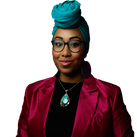Eid is a chance to celebrate the wonderful Muslim community that shaped who I am today
The best way to honour that is to be that backbone for others and pay it forward

Your support helps us to tell the story
This election is still a dead heat, according to most polls. In a fight with such wafer-thin margins, we need reporters on the ground talking to the people Trump and Harris are courting. Your support allows us to keep sending journalists to the story.
The Independent is trusted by 27 million Americans from across the entire political spectrum every month. Unlike many other quality news outlets, we choose not to lock you out of our reporting and analysis with paywalls. But quality journalism must still be paid for.
Help us keep bring these critical stories to light. Your support makes all the difference.
The meaning of Eid changes as you age, but like many religious festivals, it serves as a moment in time to come back to community. Whether it’s the “small” Eid after Ramadan (Eid-ul-Fitr) or the “big” one a few months later (Eid-ul-Adha), there is something about interrupting daily life for celebration and worship that never gets old.
Growing up, Eid wasn’t just the one day of prayer. It involved weeks of excitement in the lead up, such as shopping with my mother and choosing a new special outfit for the day. The house would be scoured until it gleamed (the Muslim version of a spring clean), and the requisite sweets were baked (or bought) before being duly laid out on heavily garnished trays for the visitors who would flood the house during the festivities. On the morning of, my father would wake us all up just as the sun rose, and we would go to pray.
These are my foundational memories of “community” as a child. Walking towards the large field behind the local Muslim school towards the lines of shiny blue tarpaulin that had been laid out before dawn and hearing the sonorous, soothing chant of worship wash over me: “Allahu Akbar, Allahu Akbar, Allahu Akbar. La ilaha illa Allah, Allah Akbar, Allahu Akbar wa lilahi alhamd.” Smiling at each other as we passed, wishing friends and strangers alike an “Eid Mubarak”, blessings on blessings, good tidings for the year ahead.
Aunties – blood relatives or not – who I hadn’t seen in for a year would coo over “how much I’d grown”, uncles would loudly clasp each other’s forearms in greeting, friends would compare outfits. There would be food, laughter, and the soft drink and tea was always flowing. And although I didn’t realise it at the time, these people were the people who were moulding me into the person I am today.
As I grew older, I moved away. I started working on oil and gas rigs, and would spend Eid calling family and smiling nostalgically at photos on my social media feeds. Settling into adult life, Eid was now spent with friends in different cities around the world. We learnt to create our own rituals and traditions, but as it turned out, they always had something in common with our childhood experiences. No matter where we were from, we found ourselves striving to replicate that feeling: yearning for a sense of belonging, meaning, and ultimately, community.
The Muslim “community” is often referred to as a single monolithic entity, but rest assured that not all Muslims share the same conception of it, or even believe themselves to be a part of it. Are we all part of a “community” by default? How important are they? And how much of ourselves do we owe to them?
Spending time and energy thinking about and investing in the communal rather than the individual may seem quaint, old-school even, in a world inundated with messages of individual success. But it is worth tempering the hubris and remembering how much of who we are is a matter of chance. Our parents, our early education and even our place of birth have significant impacts on our lives and chances of “success”. Behind every winner is an army of people who have made it possible: a coach, a dedicated teacher, a mother working double shifts.
My achievements would have been impossible if it weren’t for my parents and the people who surrounded me growing up. The best way to honour that is to be that backbone for others. Pay it forward, if you will. After all, isn’t that what community is all about?
Eid Mubarak!

Join our commenting forum
Join thought-provoking conversations, follow other Independent readers and see their replies
Comments